ISPP Subject Matter Committee:
Seed Pathology
|
Chair
Address, Phone/Mobile, Email
|
Gianfranco Romanazzi
Marche Polytechnic University, Ancona, Italy
e-mail
g.romanazzi@univpm.it
|
|
Co-chair
Address, Phone/Mobile, Email
|
Lindsey
du Toit
Washington State
University, USA
e-mail
dutoit@wsu.edu
|
|
Secretary
Address, Phone/Mobile, Email
|
Marwa
Moumni
National
Institute of Agronomy, Tunisia
e-mail
moumni_marwa@yahoo.fr
|
|
Established:
|
2014
|
|
Objectives/Focus
issues of the SMC
|
|
|
About the SMC
|
The ISPP Seed
Pathology Committee meets regularly to discuss about activities
involving seedborne pathogens ad potential seedborne pathogens and
organises opportunities for interactions with other bodies involved
in the field.
|
|
Past events
|
From March 2021
to August 2023, eight online
Committee
meeting were organized on 16 March 2021, 15 June 2021, 5 November
2021, 28 January 2022 15 March 2022, 7 June 2022, 29 September 2022,
3 February 2023.
|
|
Committee Activities
|
The Committee updated
the ISPP Seed Pathology Committee website and opened social networks
(Twitter, Instagram, Facebook, Youtube) to communicate the
activities of the Committee and the news about seedborne pathogens.
The Committee
collaborated with International Seed Testing Association (ISTA) and
International Seed Federation (ISF). All the members were invited to
participate in ISTA SHC Online Training on 18 and 25 February 2022.
The interim Chair of ISPP Seed Pathology Committee shared
information on the Euphresco Network for Phytosanitary Research
Coordination and Funding. The goal is to develop an infrastructure
for sharing infested seed lots for test development and validation.
The member Valerie was involved in with several others at her
institution and some other members of ISPP seed pathology were
involved in this project. The Committee organized two webinars
online (one webinar/year):
-
On April 29, 2022,
entitled
"Highlights on
seedborne pathogens" organised in
collaboration with Euphresco network and ISTA.
-
On April 21, 2023,
entitled
"Chemical treatments
to manage seedborne pathogens", organised in
cooperation with ISF, ISTA, and Italian Association for
Plant Protection
(Associazione Italiana per la Protezione delle Piante, AIPP).
|
|
Reports
|
|
|
CURRENT Committee
Members
|
Guro Brodal,
Norwegian Institute of Bioeconomy Research (NIBIO), Norway
Quenton
Kritzinger, University of Pretoria, South Africa
Jose da Cruz
Machado, Federal University of Lavras, Brazil
Marie-Agnes
Jacques, INRAE, France
Gary Munkvold,
Iowa State University, USA
Dorota Szopinska,
Polish Phytopathological Society, Poland
Shuxian Li,
United States Department of Agriculture, USA
Gerbert Hiddink,
Enza Zaden Seed Operations, The Netherlands
Ron Walcott,
University of Georgia, USA
Valerie Grimault,
GEVES, France
|
|
Publications
|
Publications
Following invitation to the
ISPP Seed Pathology Committee of the Subject Committee
Coordinator Khaled Makkouk,
three volunteer members Marwa Moumni, Guro Brodal and Gianfranco
Romanazzi, wrote an invited review for Food Security entitled
"Recent innovative seed
treatment methods in the management of seedborne pathogens",
link
|
©
The International Society for Plant Pathology Inc. All rights reserved.
Web Site: Peter Williamson
|

